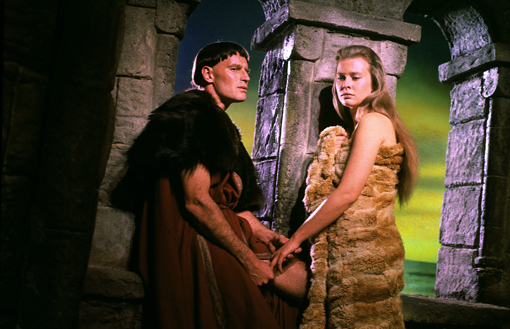GB. 2014. Blu-ray. Eureka! Entertainment. 121 minutes. £15.99.
 About the Author: Dr Sheldon Hall is a Senior Lecturer in Stage and Screen Studies at Sheffield Hallam University. He is the author of Zulu: With Some Guts Behind It - The Making of the Epic Movie (Sheffield: Tomahawk Press, 2005; reprinted 2006; 2nd edition due in 2014); with Steve Neale, Epics, Spectacles and Blockbusters: a Hollywood History (Wayne State University Press, 2010) and among the articles he has contributed to books and journals is a chapter on Straw Dogs in Seventies British Cinema (ed. Robert Shail, BFI/Palgrave Macmillan, 2008).
About the Author: Dr Sheldon Hall is a Senior Lecturer in Stage and Screen Studies at Sheffield Hallam University. He is the author of Zulu: With Some Guts Behind It - The Making of the Epic Movie (Sheffield: Tomahawk Press, 2005; reprinted 2006; 2nd edition due in 2014); with Steve Neale, Epics, Spectacles and Blockbusters: a Hollywood History (Wayne State University Press, 2010) and among the articles he has contributed to books and journals is a chapter on Straw Dogs in Seventies British Cinema (ed. Robert Shail, BFI/Palgrave Macmillan, 2008).
Aside from its prestigious Masters of Cinema series, Eureka! Entertainment also offers a Classics label that seems to serve as a catch-all rubric for older titles not deemed worthy of more elaborate special editions. Included on this label is a trio of medieval adventure films: The Black Shield of Falworth (1954) and Prince Valiant (1954) have both been released in separate DVD and Blu-ray editions, but The War Lord (1965) has previously only been available in DVD format. By far the most impressive of the three, it has now been provided with a Blu-ray release which, for all that it is bereft of significant special features, nevertheless sets a benchmark of quality for its superb hi-def transfer of a film which properly merits promotion to MoC status.

Directed by Franklin Schaffner, The War Lord was a personal project for its star, Charlton Heston, who bought the film rights to an unsuccessful Broadway play, The Lovers (1962), and developed the screenplay with John Collier and Millard Kaufman. Set in eleventh-century northern Europe, the story concerns a Norman knight, Chrysagon de la Crux (Heston), tasked with keeping the peace in a remote coastal marshland plagued by pillaging from Frisian raiders. The feudal lord must deal with a local populace still ruled by pagan superstition but succumbs to his own inner demons when he falls for a virginal maiden (Rosemary Forsyth) and on her wedding night asserts his droit du seigneur – the right of primae noctis, or defloration of the new bride. His desire, however, is reciprocated and when he refuses to give the woman back the villagers form an alliance with the Frisians, who lay siege to Chrysagon’s tower stronghold.
Heston and Schaffner wanted the film to be an intimate personal drama rather than an epic. Universal had other ideas and preferred, in Heston’s words, a ‘minor-league El Cid’. Schaffner’s first cut of nearly three hours was whittled down by the studio’s editor to two, losing much footage of pagan rituals (described by Heston as Bergmanesque) in favour of several extended battle scenes. That the finished version retains its dramatic integrity and coherence is proof of the material’s quality: what is missing is not missed and what is there is good enough to survive on its own, despite some unfortunate sound dubbing and dubious blue-screen process work.
Heston’s own performance is among his best, a reminder of why the actor garnered so much critical respect in the mid-1960s. Chrysagon is a pointed contrast to the high-minded, selfless hero of El Cid (1961). Tired of service and longing for personal satisfaction of a sort denied him because of his feudal obligations, he’s a vulnerable rather than a messianic figure and allows Heston to exercise a sensitivity not often associated with his macho persona. The supporting cast also includes fine work from Richard Boone as Chrysagon’s rugged retainer Bors, Maurice Evans as a Christian monk, and Niall MacGinnis as the village elder.
Schaffner’s careful Panavision compositions and Russell Metty’s rich lighting schemes are beautifully served by the Blu-ray transfer, which captures the authentic density of the original Technicolor 35mm release prints. The sound is authentically mono, clearly reproduced and with no attempt at rechanneling for stereo. The disc itself contains only an isolated music track (the splendid score is mostly the work of Jerome Moross) and a panned-and-scanned trailer from what looks like a 16mm source. But the package includes a 28-page insert booklet with an informative essay by Michael Brooke, a reprint of Tom Milne’s 1966 review from the BFI’s Monthly Film Bulletin and extracts from Heston’s published diaries, The Actor’s Life (1978), offering contemporary insights into the production. The significant upgrade from the DVD edition makes this an essential purchase for anyone interested in the star, the director or the genre.
Dr Sheldon Hall